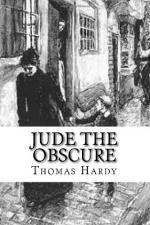|
This section contains 2,946 words (approx. 10 pages at 300 words per page) |

|
SOURCE: "Jude the Obscure: A Psychoanalytic Study", in University of Hartford: Studies in Literature, Vol. 13, No. 1, 1981, pp. 78-90.
In the following essay, Edwards and Edwards interpret the unconscious motivations of Jude, arguing that he "fails ultimately because he is too rational and too controlled."
When Thomas Hardy wrote Jude the Obscure, he hoped that the novel would be "cathartic," but it isn't. Despite the fact that Jude becomes increasingly rational and, in some important ways, comes to know himself, the ending offers no consolation, no purgation. Instead, it fizzles out before Jude can discover answers to the questions which baffle him. So the elevation of feeling which accompanies Oedipus's discovery of the awful truth is replaced, in Jude the Obscure, with depression.
Attempts to explain Jude's string of failures and, consequently, the depressing ending, generally focus on Jude's passion or on what Hardy himself called "the opposing environment...
|
This section contains 2,946 words (approx. 10 pages at 300 words per page) |

|


